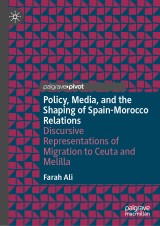Details

Policy, Media, and the Shaping of Spain-Morocco Relations
Discursive Representations of Migration to Ceuta and Melilla|
42,79 € |
|
| Verlag: | Palgrave Macmillan |
| Format: | |
| Veröffentl.: | 20.07.2024 |
| ISBN/EAN: | 9783031640179 |
| Sprache: | englisch |
| Anzahl Seiten: | 144 |
Dieses eBook enthält ein Wasserzeichen.
Beschreibungen
<p>This book uses sociolinguistic approaches to explore how media discourse on undocumented migration informs Morocco-Spain political relations. Historically, much of the contact between these two nations has been through conquest - first through the Umayyad Caliphate taking control of the Iberian Peninsula (then called Hispania) in the 8th century, and then through Spain’s occupation of northern Morocco in the 20th century. Though these historical roots have undoubtedly played a role in shaping present-day Morocco-Spain relations, migration has also become another critical element, as the majority of legally authorized migration to Spain comes from Morocco. Additionally, Morocco serves as a sojourn for much of the undocumented migration to the Spanish autonomous cities of Ceuta and Melilla, both of which are enclaves in Morocco and common entry points for North African and Sub-Saharan African immigrants. Migration to Ceuta and Melilla has therefore become a flashpoint for anti-immigration attitudes that are frequently perpetuated in political and media discourse. The author uses these cities as a case study, situating them within the wider context of both immigration-related policies and news articles in order to examine how migration is represented in Spain and Morocco. The book connects media discourse with policy discourse, and addresses how these mediums (1) co-construct anti-immigration and xenophobic ideologies, and (2) shape and are shaped by the somewhat strained relations between Spain and Morocco. This book will be of interest to students and scholars of Discourse Analysis, Sociolinguistics, Migration Studies and Migration Policy, Media Studies and Political Communication. </p>
<p>Chapter 1: Introduction.- Chapter 2: Conquest and Colonialism A Brief History of Morocco-Spain Relations.- Chapter 3: Migration to Spain and Rebuilding “Fortress Europe”.- Chapter 4: Migration Policies in the EU and Spain.- Chapter 5: Media Discourse in Spain.- Chapter 6: Media Discourse in Morocco.- Chapter 7: Conclusion.</p>
<p><b>Farah Ali</b> is Assistant Professor of Hispanic Studies at DePauw University in Greencastle, Indiana, USA.</p>
<p>This book uses sociolinguistic approaches to explore how media discourse on undocumented migration informs Morocco-Spain political relations. Historically, much of the contact between these two nations has been through conquest - first through the Umayyad Caliphate taking control of the Iberian Peninsula (then called Hispania) in the 8th century, and then through Spain’s occupation of northern Morocco in the 20th century. Though these historical roots have undoubtedly played a role in shaping present-day Morocco-Spain relations, migration has also become another critical element, as the majority of legally authorized migration to Spain comes from Morocco. Additionally, Morocco serves as a sojourn for much of the undocumented migration to the Spanish autonomous cities of Ceuta and Melilla, both of which are enclaves in Morocco and common entry points for North African and Sub-Saharan African immigrants. Migration to Ceuta and Melilla has therefore become a flashpoint for anti-immigration attitudes that are frequently perpetuated in political and media discourse. The author uses these cities as a case study, situating them within the wider context of both immigration-related policies and news articles in order to examine how migration is represented in Spain and Morocco. The book connects media discourse with policy discourse, and addresses how these mediums (1) co-construct anti-immigration and xenophobic ideologies, and (2) shape and are shaped by the somewhat strained relations between Spain and Morocco. This book will be of interest to students and scholars of Discourse Analysis, Sociolinguistics, Migration Studies and Migration Policy, Media Studies and Political Communication. </p>
<p><strong>Farah Ali</strong> is Assistant Professor of Hispanic Studies at DePauw University in Greencastle, Indiana, USA.</p>
<p><strong>Farah Ali</strong> is Assistant Professor of Hispanic Studies at DePauw University in Greencastle, Indiana, USA.</p>
Includes a range of narratives from both Spain and Morocco and in multiple languages Uses a specific case study (Ceuta and Melilla) to connect to a broader discussion about Morocco-Spain relations Draws on a sociolinguistic lens to focus on the role that language plays
Diese Produkte könnten Sie auch interessieren:

Languacultural Hybridity and Translation: Theorizing Persian Literature's Transition to English

von: Zahra Reyhani Monfared

60,00 €

Gendergerechte Sprache im Vergleich: Unterschiede zwischen Slowakisch und Slowenisch

von: Katarzyna Skorska

13,99 €

Der Einsatz von Stereotypen im Fremdsprachenunterricht. Rolle und Nutzen

von: Leila Ikram Berhil

5,99 €













